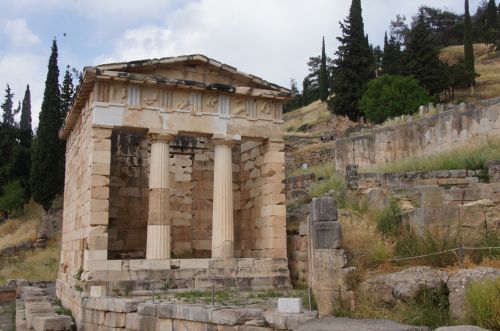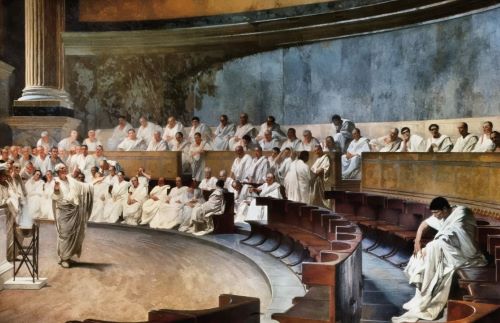

The myth of civic virtue as the foundation of citizenship has persisted for over two millennia, but history reveals a more complicated truth.

By Matthew A. McIntosh
Public Historian
Brewminate
Citizenship as Ideal and Instrument
From Pericles’ funeral oration to Cicero’s rhetorical invocations of civitas, citizenship in the ancient world has often been cast in romantic terms, an identity conferred by shared culture, moral virtue, and political participation. Yet behind these elevated ideals stood a far more selective and transactional reality. Citizenship in both Greece and Rome was not only a status of belonging but a scarce political resource, guarded jealously by those who already held it and strategically conferred upon others for reasons that rarely aligned with democratic principle.
In many ways, the ideals voiced in classical texts served to obscure the mechanisms through which citizenship was actually distributed. Civic inclusion did not operate on the basis of universal participation, nor did it emerge from a naturalized sense of communal equality. Instead, it often functioned as a political currency, available for purchase, reward, or inheritance, and frequently withheld from the very people whose labor and sacrifice made the polis or the res publica possible. Just as modern nations use wealth-based visas and fast-tracked citizenship to attract capital and secure loyalty, ancient societies recognized the value of civic inclusion as a tool of governance and control.
The Greek Polis and the Limits of Belonging
Athens and the Politics of Exclusion

Athens remains the most discussed case of ancient citizenship, not only because of its democratic structure but also because of its stark exclusions. By the mid-fifth century BCE, Athenian citizenship had become increasingly restrictive. Pericles himself instituted a law in 451 BCE that limited citizenship to those born of two Athenian parents, a move that effectively curtailed the growing number of foreign-born residents claiming political rights.1 This act of narrowing the citizen body, far from a reflection of democratic expansion, reflected growing concerns about social cohesion, identity, and control in a rapidly changing city.
Despite Athenian claims to democratic equality, the mechanisms of entry into citizenship were rarely egalitarian. Metics—resident foreigners—could live, work, and even pay taxes in Athens, but they remained excluded from political rights unless granted citizenship through a formal decree by the assembly. These grants were rare and typically rewarded military service, exceptional loyalty, or substantial benefactions to the city.2 In short, they were not rooted in moral or civic virtue, but in usefulness to the polis.
The case of Pasion, a freed slave turned banker who earned Athenian citizenship after years of lucrative service, offers a compelling example.3 His path to inclusion rested not on assimilation but on the wealth and resources he could offer the state. This mirrors modern practices where wealthy investors secure naturalization not by cultural integration but by economic leverage.
Sparta: Birthright and the Economics of Full Citizenship
In contrast to Athens, Sparta practiced an oligarchic system of restricted citizenship from its very foundations. Full Spartiate status (homoioi) was contingent not only on descent but also on a citizen’s capacity to contribute to the communal messes (syssitia).4 This created an implicit economic barrier: failure to meet the material obligations of communal life could lead to demotion in status. Over time, the number of full citizens in Sparta declined, not because of invasion or conquest, but because of economic stratification. The very definition of citizenship thus had a fiscal component, rooted in one’s ability to sustain the lifestyle of the elite warrior caste.
Spartan citizenship was not a reward for virtue but a privilege sustained by wealth. Those unable to keep pace – through debt, misfortune, or policy – were systematically pushed out, not unlike contemporary denials of citizenship for immigrants unable to meet asset thresholds or income requirements.
Roman Citizenship and Imperial Strategy
Republican Roots and Expanding Utility

In the Roman Republic, citizenship was initially defined by birth, landholding, and political participation, but it was far more flexible than in Greek poleis. As Rome expanded, so too did its strategic use of citizenship as a mechanism of control. Rome’s use of civitas sine suffragio (citizenship without the vote) allowed it to extend legal rights to conquered peoples while withholding full political agency.5 This practice kept provincial populations legally tethered to the Republic without granting them the ability to shape its laws.
The Social War (91–88 BCE) was fought in part over the inequities of this two-tiered system. Rome’s Italian allies, long excluded from full political participation despite bearing the burdens of military service, demanded enfranchisement. Only after years of bloodshed did Rome offer blanket citizenship to all free Italians through the Lex Julia of 90 BCE.6 Even this concession, however, came with strategic conditions, cities that surrendered sooner received more favorable terms than those that resisted. Here again, civic inclusion was wielded less as a moral principle than as a tactic.
Empire and the Citizenship Marketplace
Under the Principate, Roman citizenship became even more commodified. Freed slaves, particularly those who worked in the imperial household or in elite families, could be manumitted with full citizenship, and their children born free.7 The granting of citizenship was no longer merely a political act, but increasingly an economic and social one, tied to status, labor, and proximity to power.
The emperor Caracalla’s Constitutio Antoniniana in 212 CE ostensibly democratized citizenship by granting it to all free inhabitants of the empire. Yet even this apparent act of inclusion was likely motivated by fiscal concerns: Roman citizens paid certain taxes that non-citizens did not, and extending citizenship may have been a way to shore up imperial revenues.8 What had once been a marker of elite status was now diffused across the empire, but not without cost or consequence.
Roman citizenship had thus evolved from a participatory political identity into a tool of imperial integration and fiscal extraction. It had become less a badge of active civic engagement than a passively held status, at times bought, bestowed, or inherited, but rarely earned in the democratic sense.
Contemporary Parallels: Golden Visas and Selective Inclusion

The modern world echoes these ancient dynamics with startling clarity. Today’s “golden visa” programs allow affluent individuals to purchase residency or citizenship through investment, bypassing the lengthy integration processes required of others. In countries like Malta, Cyprus, and even the United States, wealth functions as a gateway to legal belonging.9 Meanwhile, refugees, migrant laborers, and low-income immigrants face a gauntlet of exclusions, mirroring the ancient metics or provincial allies whose contributions to society went unrecognized in the laws that governed them.
This parallel is not merely metaphorical. Both ancient and modern regimes of citizenship operate on an unstated hierarchy, in which wealth and utility determine inclusion. While the rhetoric of equality may dominate civic discourse, the reality of legal status, access, and recognition continues to be shaped by economics and power.
Citizenship remains a prized commodity, one that states distribute carefully, strategically, and often with calculation. Far from a neutral identity or moral category, it is a form of structured inequality, dressed in the language of national belonging.
Conclusion: The Inheritance of Exclusion
The myth of civic virtue as the foundation of citizenship has persisted for over two millennia, but history reveals a more complicated truth. Whether in the agora or the forum, the decision to grant or deny citizenship has always served political ends. The story of ancient citizenship – its prices, its privileges, its denials – is not a distant past but a living legacy. It reminds us that belonging has always had a cost, and that the gates of the polis, however idealized, were never truly open to all.
Appendix
Footnotes
- Aristotle, Athenian Constitution, 26.4.
- Mogens Herman Hansen, The Athenian Democracy in the Age of Demosthenes (Oxford: Blackwell, 1991), 94–96.
- Edward M. Harris, Democracy and the Rule of Law in Classical Athens (Cambridge: Cambridge University Press, 2006), 137.
- Paul Cartledge, Sparta and Lakonia: A Regional History 1300–362 BC (New York: Routledge, 2002), 146.
- Claude Nicolet, The World of the Citizen in Republican Rome (Berkeley: University of California Press, 1980), 105.
- Erich S. Gruen, The Hellenistic World and the Coming of Rome (Berkeley: University of California Press, 1984), 524–525.
- Keith Bradley, Slavery and Society at Rome (Cambridge: Cambridge University Press, 1994), 144–146.
- Fergus Millar, The Emperor in the Roman World (Ithaca: Cornell University Press, 1977), 418.
- Kristin Surak, The Golden Passport: Global Mobility for the Rich (Cambridge: Harvard University Press, 2023), 34–36.
Bibliography
- Aristotle. Athenian Constitution. Translated by H. Rackham. Cambridge: Harvard University Press, 1935.
- Bradley, Keith. Slavery and Society at Rome. Cambridge: Cambridge University Press, 1994.
- Cartledge, Paul. Sparta and Lakonia: A Regional History 1300–362 BC. New York:
- Routledge, 2002.
- Gruen, Erich S. The Hellenistic World and the Coming of Rome. Berkeley: University of California Press, 1984.
- Hansen, Mogens Herman. The Athenian Democracy in the Age of Demosthenes. Oxford: Blackwell, 1991.
- Harris, Edward M. Democracy and the Rule of Law in Classical Athens. Cambridge: Cambridge University Press, 2006.
- Millar, Fergus. The Emperor in the Roman World. Ithaca: Cornell University Press, 1977.
- Nicolet, Claude. The World of the Citizen in Republican Rome. Berkeley: University of California Press, 1980.
- Surak, Kristin. The Golden Passport: Global Mobility for the Rich. Cambridge: Harvard University Press, 2023.
Originally published by Brewminate, 07.17.2025, under the terms of a Creative Commons Attribution-NonCommercial-NoDerivatives 4.0 International license.


